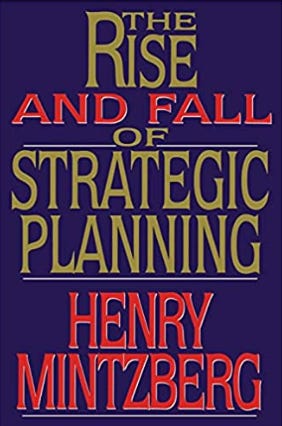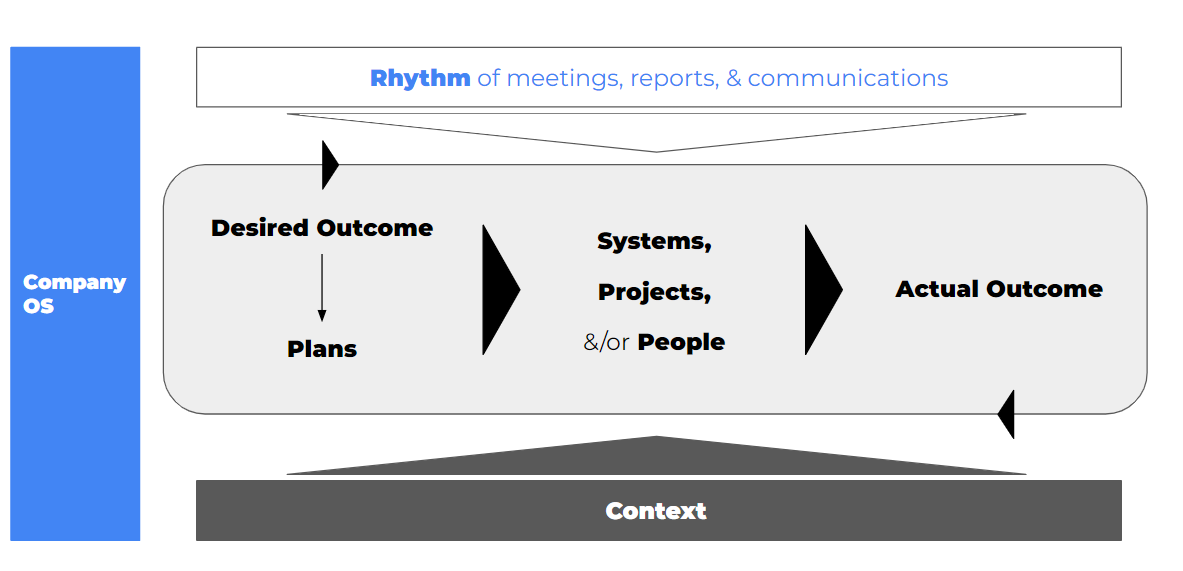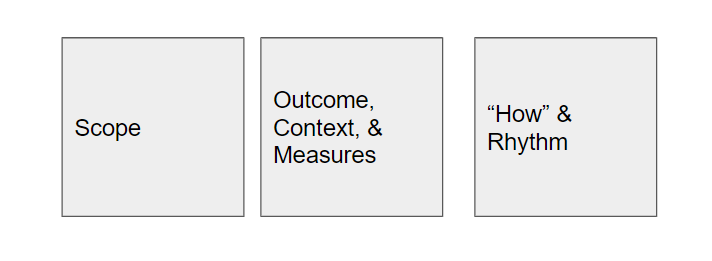On Planning
From chaos to order
Hi all —
This week, I’m diving deeper into operations to talk about planning.
Planning is EITHER:
Absolutely necessary to growing your business
Exactly the opposite of the Agile / Lean Startup ethos, which means it is counterproductive to growing your business
Something that rose and fell before we were born:

As our company has grown, I have “come to Jesus” on planning, in that I now see how and when planning can be useful. But I also see how the word “planning” can be confusing - isn’t it just goal-setting? If not, what IS planning? And what ISN’T planning?
I’m taking a very narrow definition of planning to focus on the formal planning process that founders, executives, and leaders perform as part of the company’s operating system, rather than a broader definition of planning as “anything that looks towards the future.”
This narrow definition of planning - which I’ll describe in more detail later - helps founders, executives, and team leaders think rigorously about the future; coordinate people, systems, and projects to try to make the best possible future happen; communicate across the organization; and get proactive rather than reactive.
What planning isn’t
I find it easier to start by defining something by looking at the negative - here are 10 things that are NOT planning:
Planning is NOT Strategy. I don’t know why people call planning “strategic planning” other than “it pays more”… but planning is different from strategy. Strategy tells you how you’re going to approach the market in order to win; Planning gets into the details of how you’re going to make a specific future state come into existence. Having a strategy is an important prerequisite of planning, because strategies tell you the thousands of plans you don’t have to make.
Goal-setting is NOT planning. Goals are NOT plans. Goals and OKRs are fine, but they are an OUTPUT of planning, not a replacement for it. In fact, goals without planning are (1) likely to be bad / mutually incoherent goals and (2) likely to be missed because nobody’s done the critical work to think through how they’ll hit their goals.
Planning is NOT your typical templated Business Plan. The Business Plan is a one-time creation at the start of a business and is usually used to raise money (largely replaced by pitch decks nowadays). The kind of planning I’m talking about is done relatively frequently, is internal to the company, and is used to achieve business outcomes - not raise money.
Planning is NOT project management or task management. The phrases “sprint planning”, “project planning”, “task planning”, “day planning”, etc. all make this confusing. As I’ll describe later, informal planning happens as part everyday work; I’m concerned with the formal process for planning new initiatives, for new executives, and/or as part of a company’s annual/quarterly operating rhythm.
Planning is NOT budgeting. Plans influence budgets, of course; budgets likewise influence plans. But just as goal-setting is downstream of planning, so is budgeting.
Product roadmaps are NOT plans. Product roadmaps are sequentially prioritized sets of product projects. As I’ll describe later, plans incorporate projects but are much more than a list of projects.
Planning is NOT just a Google Doc. Done well, planning results in clear, coherent goals to track. It results in a clear sense of which projects to prioritize, which systems to build / adjust, what to do with people, and how to communicate progress. In other words, planning includes execution.
Planning is NOT controlling the future. Very little is under your control as a founder or an executive. You control your actions, not the world around you. Planning helps on the “supply side” (what you control), not the “demand side” (what’s going on in customers’ worlds that creates your business opportunity).
Planning is NOT a replacement for knowing. If you don’t know anything (which is the reality for most startups prior to product-market fit), planning won’t solve that. Go out and learn something real by selling & implementing something (remember: Strategy is a Blue Collar Job), then start thinking about planning.
Planning is NOT (necessarily) a drawn-out, Corpo-Bureaucrat-MBA tax on builders. Nor does it (necessarily) kill emergence, opportunism, creativity, and agility. Done poorly, it DEFINITELY is a soul-sucking exercise that creates a soul-sucking workplace. But this is also true of any poorly applied business practice. Done right, planning liberates “builders” to have the guardrails AND the flexibility to build the right thing creatively. And it helps the company align activities while checking in to see if any big changes are needed.
What is planning, then?
Remember this diagram from last week?
“Plans” are found at the bottom left of the work system in the grey box. Planning is a way to articulate a coherent path towards a tangible future state. It’s how you coordinate systems, projects, and/or people to achieve your desired outcome.
In more detail:
Planning helps you determine what future outcome you’re shooting for, given your business context (e.g., your strategy, guiding principles, and current state). When you’ve determined your outcome, you make its achievement measurable via goals / KPIs / OKRs. You then move on to HOW you’ll achieve this outcome: The systems, projects, and/or people you need to make the outcome happen. And finally, you create your rhythm of meetings, reports, and communications to ensure that you’re on track and doing the right things to achieve the future outcome, and that the outcome still makes sense.
There are two types of plans, informal and formal:
Informal plans & planning: This is what you do as part of most tasks and projects - think about the end-state and work backwards. This kind of planning might not even be written down.
Formal plans & planning: This is the semi-structured processes that leaders go through in order to put a stake in the ground and say, “this is where I believe we are headed and how we are going to get there.” This happens at a few different cadences:
Regular formal planning: Annually and/or quarterly. Sometimes even monthly. This is your typical goal-setting cadence, which is why people confuse goals for plans.
Planning for new executives: Whenever a new executive or leader joins, planning helps them articulate where their energies will be directed, what they’re shooting for, and how they’ll get there.
Planning when something important changes: An unanticipated problem or opportunity emerges, which means you need to get back to the drawing board. This can happen any time.
For the purposes of this post, I’m talking about formal planning. But the principles of formal planning can hone your informal planning skills, too.
Why plan at all?
If formal planning is a subtle art that can mess up your company… why bother planning at all? Why not just dictate goals? Why not let the company vision drive coherent and coordinated action? Why not take Rob’s advice and just think about how we get from here rather than to there? And is planning for everybody, or just certain people at certain company stages?
Let’s start with the null case: Why plan at all?
Combat the reactive + instant nature of work: Especially with always-on communication channels like email and Slack, even senior executives find themselves reacting and firefighting by default. This is the entropy of today’s working world. Without a dedicated process by which you zoom out and think deeply, work tends towards distracted, anxious multitasking.
Goals are not enough: Everyone seems to think goals and KPIs are enough. They aren’t, because they miss two critical pieces of deep thinking that are required to achieve the right goals:
The coherent end-state: A single-sentence objective is easy to misunderstand. But a longer, thoughtful description of where you’re headed helps put goals into context and make sure they are the right goals.
The “how”: Just setting goals and saying “make it happen” might work for later-stage companies, “mature” & predictable departments, or for the top 1% of leaders. I’m not convinced, though. Communicating and pressure-testing the how makes it more likely that goals will actually be achieved; or at least, make it clear what we DO and DON’T know.
Decentralization & hands-off management: Interestingly, an effective formal planning process enables hands-off management and day-to-day decentralization. If we agree on the plan, and nothing big is changing, do we need to talk at all? Without formal planning, I need to dig in to create my own mental model of what’s going on, which leads to more hands-on management and instant communication.
In what context might you need to plan? Here’s the list of things you might be saying to yourself that suggest you might need to think about a formal planning session:
I want to raise the next round of funding / I just closed a round of funding.
Our goal-setting process doesn’t feel like it’s very effective / We’re not hitting our goals.
I just hired a new leader / I just joined as a new leader / I just got promoted
Things in our business / my department are changing, and I need to level up
I feel like I’m too involved in too many things
I can’t tell if my leaders are overwhelmed, underperforming, or poorly focused
It feels like we’re doing too many things / It feels like we’re not doing the right things
How do I think about planning when the future is unpredictable? Why not just worry about where to go from here rather than how we’re going to get there?
This is a question I’ve been wrestling with for a while. I believe that great software products generally unfold, they’re not blueprinted. Creativity, randomness, and sparks of insight generate nonlinear improvements that build upon themselves. This is because the future is unknowable, as is most of the present and past.
That said, most parts of your business don’t operate at the unplannable extreme. New product development, certainly. Everything else is plannable to some extent or another, and benefits from formal planning. Sure, plans should reflect epistemic humility, and we should remember that plans do not CREATE reality. But for most departments, we generally know enough to be able to plan decently enough.
All this preamble aside: How do you actually plan?
How to Plan
Plans are shared, pressure-tested, and revised as they come into existence AND as they are implemented. Plans are living documents, and like good products they unfold with time, judgment, and new knowledge.
I have learned that the planning process typically involves three-ish stage-gates, which are stopping points where you need to align with others before moving forward with planning:
Scope: What part of the organization is this plan for? What’s the timeline?
Outcome, Context, & Measures: What’s the desired end-state, given what we know about the current state? How do we know if we’re there?
“How” & Rhythm: What are the projects, systems, and/or people that it’s going to take to get this plan enacted? What’s the RACI? How are we going to communicate & check-in on progress towards the plan, and what are the checkpoints for us to review that the plan still makes sense?
Summary
Growing startups operate on the knife’s edge of utter chaos. Building your company’s operating system helps you trend more towards order than chaos, but in order to do so you need a mental model and a set of practices that help you build your system to generate awesome outcomes.
Planning is a key component - build the rituals of effective planning and you’ll get more visibility; better outcomes; and a leaner, smarter, higher-ownership organization.


